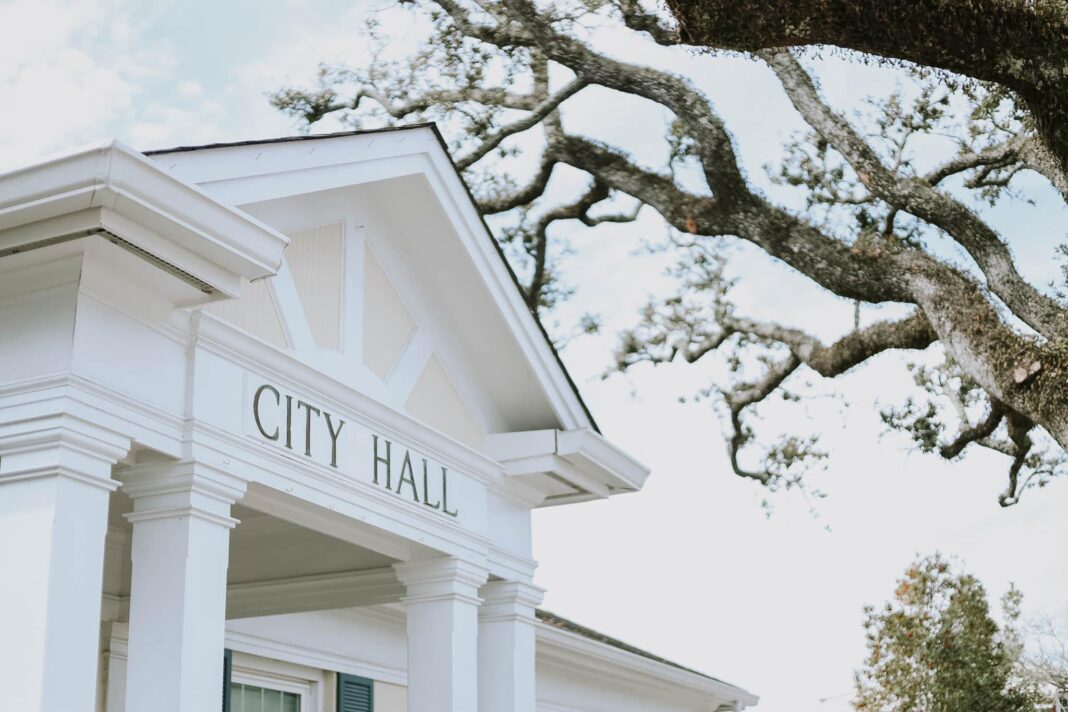OCEAN SPRINGS, MS — Imagine attending a city meeting, prepared to voice your opinion on a local issue that directly impacts your community, only to be told: “We’ve already heard enough from your side.” That’s the reality for residents of Ocean Springs, where stringent public comment rules limit input to just two speakers per side of any issue during Board of Alderman meetings. Some argue these restrictions silence diverse viewpoints, turning what should be a forum for open discourse into a carefully controlled narrative.
At the heart of the controversy is a policy that allots 30 minutes for public input, but restricts discussion to two speakers from each side of an issue. Compared to neighboring cities like Biloxi and Gulfport, where more inclusive rules allow for broader public participation, Ocean Springs is now seen as an outlier on the Mississippi Gulf Coast, and the backlash is growing.
In Biloxi, the City Council allows up to 45 minutes for citizen comments, with no restrictions on how many speakers can address an issue. Similarly, Gulfport’s policy grants up to 30 minutes for public input, without limiting the topics or number of speakers on either side. Both cities allow their residents more freedom to express their views on multiple issues, ensuring that meetings capture a broader range of perspectives.
These cities demonstrate that it is possible to manage time, while still fostering robust public participation. The Ocean Springs rules, by contrast, allow only two speakers per side of an issue, which many residents see as a restriction on free speech.
“It’s dismissive, because it’s like saying we already heard a couple of opinions, so yours isn’t important,” said Ocean Springs resident James Lewis, a frequent participant in city meetings. “Then they tell us there’s only a handful who speak out. Well, that’s because their rules limit the public.”
The city’s approach curtails a diversity of ideas, particularly on complex issues affecting multiple facets of the community. By narrowing the discussion to just two voices on each side, residents feel that important perspectives are being left out, and the open dialogue needed to reach well-rounded decisions is being sacrificed.
A Tradition of Public Voice: The History of Public Comments in America
Public comments at government meetings trace back to colonial town halls, where citizens voiced concerns directly to their leaders. This tradition laid the groundwork for the First Amendment, affirming the right to free speech and petitioning the government. As towns grew, time limits and structured comment periods were introduced to keep meetings efficient, but the core principle remained: public voices are essential to democracy.
Federal and Supreme Court rulings have reinforced that public forums should welcome diverse viewpoints, so long as participation rules are reasonable and applied fairly. Cities like Gulfport and Biloxi honor this tradition by allowing broad, unrestricted input, while Ocean Springs’ limits spark debate over how much citizens’ voices should be curtailed.
Growing Pressure and Free Speech Concerns
The restrictive public comment policy isn’t the only free speech issue causing concern in Ocean Springs. The city is currently embroiled in a lawsuit brought by Jeff Gray, a veteran and activist who claims his First Amendment rights were violated when he was removed from public property for peacefully holding a sign that read “God Bless the Homeless Vets.” The lawsuit has drawn national attention. After the police department’s Facebook page was flooded with hundreds of comments from supporters of free speech, the city decided to stop allowing anyone to comment on police matters posted to the page.
In another instance that raised eyebrows, Ocean Springs Alderman Jennifer Burgess recently suggested that media outlets should refrain from writing anything that may offend city officials, despite whether the topic is of the public interest. This statement has been met with sharp criticism from journalists and free speech advocates, who argue such comments undermine the vital role of a free press in holding government accountable.
These incidents, combined with the restrictive public comment rules, paint a picture of a city struggling to navigate the balance between maintaining order and respecting citizens’ constitutional rights.
At the time of publishing, City Hall had declined to comment on free speech issues in Ocean Springs.
A Look Ahead
With neighboring cities offering more inclusive policies and rising tensions over the city’s treatment of public speech, the pressure is mounting on Ocean Springs to reconsider its stance. Many residents are calling on the Board of Aldermen to adopt a more open public comment policy, one that allows for greater participation, similar to Biloxi and Gulfport.
As the debate over public input and free speech continues, it remains to be seen whether Ocean Springs will adjust its policy. For now, residents like James Lewis are left wondering why their voices are being limited, while legal battles like the Jeff Gray lawsuit and comments from officials like Jennifer Burgess continue to fuel concerns about the city’s approach to free speech.


